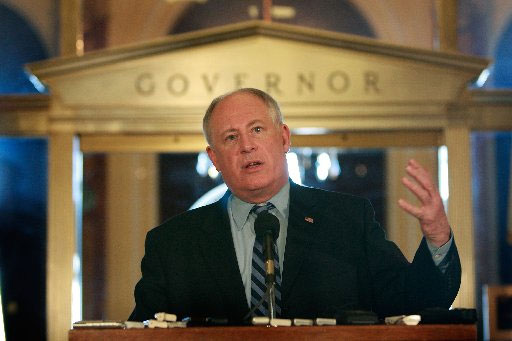By Eric Ferkenhoff and Maryam Jameel
 Only hours before a Sunday deadline, Illinois Gov. Pat Quinn inked a $33.7 billion budget Saturday, balancing the books but angering some education and child welfare experts and confounding political observers who said the Democrat may well have done more harm than good to the state’s neediest residents.
Only hours before a Sunday deadline, Illinois Gov. Pat Quinn inked a $33.7 billion budget Saturday, balancing the books but angering some education and child welfare experts and confounding political observers who said the Democrat may well have done more harm than good to the state’s neediest residents.
Quinn, facing a $43.8 billion budget deficit – reportedly the nation’s worst — before the new fiscal year 2013 kicked in, took a budget that the General Assembly handed him on Friday, and cut it by $57 million.
In doing so, Quinn said ”our priority should always be the safety and well-being of our children,” and promised to return some of the Illinois’ legislature’s planned $50 million in cuts to the Illinois Department of Children and Family Services, or DCFS, the agency that handles most abuse and neglect cases and shelters the most at-risk.
But critics said just the opposite could happen as Quinn, while saying he was protecting children and their education, cut $200 million in education funding and $85 million in child-welfare funding.
Kent Redfield, an Illinois political expert and a professor emeritus at the University of Illinois at Springfield, said that while the cuts bring immediate savings, they could deepen problems, leading to bigger spending down the road.
“We’re making short-term decisions to balance the budget, because we’re in such a huge hole,” he said. “It gets you through the new year’s budget, but it’s not cost-effective. You’re saving a little money now, and you’re going to have to spend a huge amount of money later.”
The governor also called for shuttering several prisons, including juvenile facilities and shifting that money in part to boost the reserves of DCFS. The budget also cuts education spending while trying to rein in high pensions in a politically charged move that could cause trouble come fall — when Quinn will need lawmakers’ support for some of his plans.
Speaking to reporters Saturday in Chicago, Quinn said, “This is a serious fiscal plan that pays our bills, closes facilities and prevents the collapse of our Medicaid system.” He also sought to improve housing and services for developmentally and mentally impaired residents of the state.
“The fiscal situation in Illinois is so bad that even if you’re being entirely consistent in terms of a set of priorities, that just means that whoever you’re trying to protect is going to get cut a little less worse than everybody else,” Redfield said, adding that it’s a defense of the budget’s shortcomings, but appears a realistic portrayal of the state’s circumstances.
Redfield said with Illinois’ current budget deficit, revenue to meet even core needs is scarce.
“At best, you’re going to inflict less damage to one group you say you’re favoring in budget priorities, but no one gets held harmless in the kind of situation we’re in right now,” he said.
Many critics are accusing the governor of setting up the state for a worsening financial picture going forward by cutting some aid to Illinois’ poorest families, cutting millions of dollars from the state education budget and closing prisons that will send more convicts to neighborhoods already reeling from high crime.
While state prisons and juvenile facilities are closing down, there is little talk of alternative methods to confront persistently high crime rates.
“If we don’t do anything to get people out of a culture of crime, then you’ve reduced the cost of dealing with your problem without ever getting at the system,” Redfield said. ”So shutting them down without an alternative is just balancing the budget, and the real cost of that is not in this fiscal year.”
Noting the of five adult correctional facilities and two juvenile centers, as well as some –human-services facilities in the state, a release from Quinn’s office stated: “Illinois can no longer afford outdated, half-full, very expensive facilities.”
Erick Ferkenhoff is the editor of The Chicago Bureau.
Maryam Jameel is a reporter for The Chicago Bureau.
